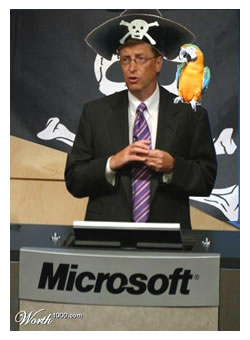
Maybe I should have saved the Bizarro World graphic from my article about American mobile web use being higher than European for this one instead. This Information Week article quotes Microsoft Business Group president Jeff Raikes as saying “If they’re going to pirate somebody, we want it to be us rather than somebody else.”
“We understand that in the long run the fundamental asset is the installed base of people who are using our products,” says Raikes, “what you hope to do over time is convert them to licensing the software.”
Such statements may fly in the face of the Microsoft credo that every non-sanctioned copy of their software translates into a lost sale and the effort and money they’ve put into things like Windows Genuine Advantage, DRM and the BSA. However, Raikes is acknowledging a truth put eloquently by Tim O’Reilly: obscurity is a far greater threat to creators than piracy.
[Raikes] said the company wants to push for legal licensing, but doesn’t want to push so hard so as to destroy a valuable part of its user base. The company recently got a stark reminder of this lesson when a school in Russia said it would switch to Linux to avoid future hassles with the pirate police.
Simply put, today’s Microsoft Office pirate stands a good chance of becoming tomorrow’s Microsoft Office purchaser. The benefits extend even further when it comes to Microsoft’s development and server tools: as the recent admission of Romanian president Traian Basescu showed, piracy can create a tech boom, which in turn drive paying customers to companies like Microsoft.
We here at Global Nerdy have a couple of things in common with Romania. One is George. The other is that I too have benefited from pirating Microsoft development tools when I was an indie coder with barely enough money to buy a development machine. After landing a couple of contracts, I made the transition that Raikes talked about: from pirate to paying customer of Visual Studio as well as ancillary products such as books, third-party ActiveX components and leigt copies of Windows. Microsoft also benefited from my developing software for Windows, thereby feeding into their business ecosystem.
On both a macro (Romania) and micro (me) level, I think the benefits of piracy far outweighed the revenues from theoretical “lost sales”.